|
“Wherever I shall be, I intend to imagine myself to be together with all the creatures in the Cenacle in Jerusalem where the Apostles received the Holy Spirit. I shall remind myself to renew this desire often. As the Apostles were there with Mary, so will I be in spirit with the most beloved Mother and Jesus. As they are my special intercessors, I am confident that they will help me and all other creatures to receive the abundance of the Holy Spirit” – St. Vincent Pallotti (OOCC X, 86).
One of the signature moments of Pope Francis’ pilgrimage to the Holy Land last year was the Mass that he celebrated in the Cenacle or Upper Room in Jerusalem. Tradition holds the Cenacle as the location of the Last Supper and the place where Mary, the Apostles, and the other disciples spent time in prayer and community prior to the descent of the Holy Spirit at Pentecost. We have just celebrated this past weekend the Feast of Mary, Queen of Apostles on Saturday and Pentecost on Sunday. These celebrations invite us to dwell in the Cenacle as a place of encounter with one another and with the Holy Spirit. The Cenacle is not a place where one stays, though. We are sent forth out into the world that needs to encounter Jesus Christ, a world in need of transformation. Pope Francis in his homily in the Cenacle reminds us of this mission of which all of us are called to be a part: “From here the Church goes forth, impelled by the life-giving breath of the Spirit. Gathered in prayer with the Mother of Jesus, the Church lives in constant expectation of a renewed outpouring of the Holy Spirit. Send forth your Spirit, Lord, and renew the face of the earth (cf. Ps 104:30)!” Reflecting on the Cenacle, St. Vincent Pallotti came to believe that all are called to take up the mission of Jesus Christ and live as apostles, sent forth to preach the Good News and bring healing to a broken and suffering world. We are not alone in this task. Mary, Queen of Apostles intercedes for us, witnesses discipleship of Christ for us, and gives us a mother’s care. The Holy Spirit permeates all that we do and calls us back to the Cenacle, to the table of the Lord in the Eucharist, to worship and fellowship with the community of faith, in order to be sent forth once again. Instituted in the Cenacle of Jerusalem, the Eucharist sustains us, nourishes us, and moves us out into the world “glorifying the Lord” by our lives (“Dismissal”, Roman Missal). Fr. Frank Donio, S.A.C., is Director of the Catholic Apostolate Center and teaches for Saint Joseph’s College Online. This blog post was first published on May 27th on the St. Joseph’s College of Maine Theology Faculty Blog. Click here to learn more about our cooperative alliance with St. Joseph’s College Online
0 Comments
 St Philip Neri whose feast we celebrate today is known as the Apostle of Joy and as the third Apostle of Rome. Throughout his ministry in Rome, he stressed the importance of joy in the life of a disciple of Christ. His own joy and humility attracted people from every walk of life to him and ultimately Christ. St. Philip was born in Florence in 1515. Born to an affluent family, he forfeited a promising career in business with his uncle in order to move to Rome in 1535. While in Rome as a layman, Philip would immerse himself in prayer during the night at the catacombs and during the day would care for the sick in the overcrowded hospitals and the pilgrims. Philip developed a following in Rome who wanted to imitate his example and was reluctantly ordained to the priesthood in 1551. Philip and this group that he attracted would “meet informally for prayer, discussion, and recreation together, before going off to minister to the needy.” They became known as the Oratorians and helped to re-evangelize Rome. While we celebrate St. Philip Neri’s feast today it is helpful to examine a few reasons as to why his charism is as relevant today as it was in the 16th century. Firstly, St. Philip’s ministry was characterized by its relational approach. He evangelized one on one. During the Carnivale in Rome which brought much disgraceful behavior with it, St. Philip went out in the city and organized events to counteract the Carnivale. He was willing to go out and meet people were they were at. He first built relationships with people and then invited them into a deeper relationship with Christ. He was able to achieve this and build so many relationships because his ministry was characterized by joy and humility. For St. Philip, joy and humility were both integral parts of the Christian life and inseparable from one another. He repeatedly said, “Cheerfulness strengthens the heart and makes us persevere in a good life. Therefore the servant of God ought always to be in good spirits.” People were attracted by his joy and authenticity and wanted to experience it for themselves. Also, St. Philip who was only ordained later on life, emphasis the role of the laity in the Church. He believed holiness was attainable for the laity and was a proponent of frequent communion and confession, himself spending hours a day in the confessional. The laity were not treated as a third order, but as a first order. The Oratory existed to serve the needs of the laity who were living in Rome. St. Philip Neri’s example should inspire us to always joyfully seek a deeper relationship with the Lord. He reminds us that we are called to holiness and he is a model for the New Evangelization. St. Philip understood we will not attract people to Catholicism if we do not exhibit the joy that is a result of our relationship with Christ. Conor Boland is a College Ministerial Intern for One Bread One Cup, at Saint Meinrad Seminary & School of Theology and is an undergraduate at The Catholic University of America.
They bought into the lie—that nothing had changed, that their dreams were stifled, that death prevailed. The locked doors reflected their locked hearts. Like anyone, they were afraid, inconsolable, at the point of despair. Save one—a virgin. She continues to model to us today what it means to live faith, what it looks like to be a disciple.
The fear of the disciples in the upper room is understandable. They had abandoned the man whom they had left everything to follow for three years. The same man they had pledged to follow unto death had been tortured and killed as their backs were turned, as they cowered for their own lives. Their hopes of a restored Jewish kingdom, a glorious king from the line of David, freedom from Roman rule and the return of God’s presence to the Temple seemed to be nailed to a cross on Golgotha, laid in a tomb hewn from rock. They had yet to see God’s plan amidst the perceived failure. How could this be God’s plan? It was so unlike their own. Their fear is our own. It is the fear of unmet desires, of unworthiness, of death, of uncertainty, of perceived silence. Like the disciples, we often fail to see God’s plan in our lives. We look around in despair and sense that He is silent. We live the reality of death, confusion and suffering and say, “nothing good can come from this.” But as the disciples quickly realized, our ways are not God’s ways. Our wills are not yet one. Much stands in the way: selfishness, greed, egoism, materialism, pride. All changes with the coming of the Holy Spirit. What makes a law-abiding Jew abandon his persecution of Christians in favor of joining them and proclaiming the Christ to Jerusalem and Rome? What makes uneducated fisherman leaders of the universal Church and martyrs for the faith? What makes the son of a wealthy Italian merchant the begging founder of a religious order and a friend of the poor? What makes a cloistered nun in Lisieux a Doctor of the Church? What makes a German priest in Auschwitz volunteer to die in place of a father? What makes a modern day Italian mother and doctor offer her life for that of her child? The Advocate, the Holy Spirit. It is the Holy Spirit who is the game changer for the Church—what will now set the disciples apart from the whole world and what continues to set Christians apart today. The Holy Spirit is the active agent of conversion in man, the third person of the Trinity who opens up the Scriptures and sets our hearts on fire. It is the Holy Spirit who enables us to live our mission. The Holy Spirit, God’s love, is the difference between the fearful men in the upper room and the on-fire disciples of Christ preaching the Gospel and converting thousands in a single day. In the Gospel today, Jesus prays for his followers in the Garden of Gethsemane while also speaking directly to you and me. He prays for something seemingly impossible: “that they may all be one” as the Trinity is one. Christ speaks these words not to frustrate his followers but to call them to a perfection possible through God alone. He utters these precious words knowing he will be sending the Holy Spirit to enable man to do this. The goal is outward. This communion—the call to unity—must lead to mission: “that the world may know that you sent me and that you loved them.” God’s love is efficacious. It cannot be contained but must be proclaimed to the world. Only God could deign to give man so dignified and impossible a call. And only God could enable man to fulfill it. This high priestly prayer of Jesus (which encompasses John 15-17) is one of my favorite parts of Scripture. It is so imbued with Christ’s love for us. The purpose of the Incarnation is about to be revealed. Christ is living his last moments and wants to remind his followers, you and me, why he came: to reveal the Father, to invite man to eternity with Him and to assure man of his lovable-ness in the eyes of God. This love of God is meant to abide in us and reach out from our hearts to the hearts of others. This is only possible through the Eucharist, which physically is Christ’s love present in us and which is made possible through the Holy Spirit. God himself calls us, but God himself equips us…with Himself. It is astounding to what we are called: to holiness, divine love. This is the Christian destiny, but not our inclination. Like the disciples, so quickly do we turn inward. So quickly do we lock the door in fear. God calls us to sanctity, which can only be achieved after an experience of the fire of God’s love. We call this Pentecost, the same outpouring of the Holy Spirit that we receive in Baptism and Confirmation. The same outpouring of the Holy Spirit that we receive every Sunday in the form of the Eucharist. Are we being transformed by this grace or do we remain in the upper room? I challenge you to go back to your own story, your own moments of conversion. When did you fall in love with God? Have you? Only armed with the certainty of being loved will we be able to love others and live out the communion and mission Jesus calls us to. And so we call upon the Holy Spirit, the love of God Himself, who was breathed out upon the disciples at Pentecost in tongues of fire. We ask the Holy Spirit to breathe new life within us, within the Church. We ask the Holy Spirit to transform us with the fire of God’s love. This results in unlocked doors, an empty room. The disciples emerged, transfigured. Will you? Kate Flannery is pursuing a Master's degree in Leadership for the New Evangelization at the Augustine Institute in Denver and graduates in May. “I don’t want to grow anymore.” This cantankerous proclamation has lately become my state of being. It sums up my exhausted emotions as I finish a two year service program, study for my comprehensive exams, move back into my Mom’s house and struggle to land a job. In grumbling to my program director that Growing up is hard and I don’t want to do it, she shared with me a piece of wisdom: “You are never done growing and you are never done with being challenged. In the growing and in the challenge you come to a deeper knowing of God.” While still dealing with the overwhelming idea of constantly growing, I have come to find truth in these words. I realized that not only is growing up hard, but being Catholic calls me to this constant growth- this constant conversion of heart!
Being Catholic calls me to encounter the messiness of challenges, the hardship of changes, and the realization that I will always be growing until I am with God. St. Augustine in his Confessions writes of this conflicted desire to want the virtues of God, yet not ready to struggle with the realities of attaining them. St. Augustine shares, “Give me Chastity, just not yet.” This is how I feel. I want holiness…just not yet do I want to have to confront the realities to attain it. I want to know God… but not deal with the messiness. I want to be filled with the Holy Spirit… but I don’t want to face the growth that the Spirit leads me to. Margaret Silf, in her book The Other Side of Chaos, writes, “But we will also take the journey in faith—not the kind of faith that knows all the answers and has mapped out the right and proper path, but the faith that says simply, “I don’t know, but I trust.” She goes on to say, “It matters that you are willing to open your heart to a wider, fuller reality, one in which over time, or perhaps beyond time, you will know that ultimately every painful harrowing of your life’s field, and every anxious tending of new and tender growth, are leading to a harvest that you can’t begin to imagine.” I try to know all the answers and map out all the “right” paths. I don’t know if I want to open my heart wider to a fuller reality. I want a plan, a job, certainty, etc. I want anything that will keep me from feeling these anxious and unsettling emotions of transition and change. Yet, as my spiritual director would say, that is not of God. God is in the messiness; he is in the hardship of leaving a place I have called home for two years. He is in the humbling action of moving back into my Mom’s home. He is found in the rejection letters coming in from jobs. There is no room for God and the work of the Spirit when I decide I know best and try to plan my path. So here I am, left with no other choice than to sit in the messiness of transition and chaos. My wanting to be with God and to know God has brought me here and it is here that I continue to learn to trust that He is with me. It may take many years, or my entire life, to see how this time led me closer to His will and to understand the need for restlessness and messiness. But, there is no doubt that by encountering the messiness and seeking God in it, I am growing in a way that will enable me to become the apostle He is calling me to be! So encounter your messiness, lean into your hardships, and know wherever you are God can be found. Pam Tremblay is a collaborator with the Catholic Apostolate Center. Editor's Note: This post was originally published on June 11, 2013 During the month of May, we especially honor Mary and her devotion to our Lord. While prayer beads have been used throughout the centuries by various religions, some believe the Blessed Virgin Mary gave us the prayer of the rosary back in the 13th century when she appeared to St. Dominic. The rosary assists us in growing a deeper appreciation for the mysteries of our Lord’s life and the witness of our Blessed Mother Mary. The mysteries help us to unite our life more closely to our Lord’s. Today, I’m sharing the story of a parishioner at my church who has a particular connection to Mary and the rosary.
Sharon Zahner began making sterling silver rosaries as a 12-year-old in a rural town that had a small Catholic community. She saw her grandmother making rosaries and wanted to learn how to make them too. Throughout grade school and high school, Zahner continued making rosaries and delivering them to the First Communicants in her town each year. After high school, Zahner focused on her college studies and did not make rosaries as often. When she moved to Jacksonville, FL with her husband, she saw in the church bulletin where a nun needed folks to help her make rosaries for missions overseas. Zahner signed up to help. She encouraged her mother to help her out as well. Her mother gathered a group of 5-6 women in her retirement community, and they made hundreds of rosaries each week for the missions. Zahner became inspired by her mother’s success and started making rosaries when she moved to her new Tallahassee parish, Good Shepherd Catholic Church. At first she started making them for children and teens going through their First Communion and Confirmation. Then she made rosaries for the hospitals, then Good Shepherd’s prison ministry, and then church retreat attendees. In addition, she now makes them for children at two other low-income parishes in the Tallahassee community. Whenever visiting priests or seminarians come to Tallahassee, Zahner supplies them with her hand-made rosaries. A visiting priest to our parish comes every summer from Africa. At first, Zahner provided him with about 60 rosaries. Father Remy asked for more on his next visit, and now it’s a tradition. Even a mission in Belize received about 150 rosaries from Zahner when they reached out to parishes around the world with the same parish name asking for rosary donations. “If you make a rosary,” Zahner said, “you just feel good. You’re helping somebody connect with the Catholic religion. I like to know that I’m connecting someone with Jesus through the Blessed Virgin.” Fifty years later, Zahner continues to make rosaries for the Tallahassee and larger worldwide communities. When I asked her how many rosaries she makes a year, she said it had to be a couple thousand. She made 500 rosaries in January alone, just so she could have enough if someone needed them to share with others. When she travels to military bases or other Catholic parishes, she brings rosaries with her. Her youngest son gave out more than 150 rosaries to Covecrest summer camp attendees each year while in high school. She even made an orange and blue University of Florida rosary for me when I was accepted to college! Zahner teaches our parish children how to make rosaries as well. Recently, she helped out at a religious education class, teaching the students how to make rosaries to give to their mothers for Mother’s Day. “Whenever I have a spare moment, I just pull out my rosary making materials and start making rosaries,” Zahner said. “People will come over to me and ask what I’m doing, and I tell them, ‘I’m making a rosary. Would you like one?’ And you know, the funny thing is, no one declines.” It takes Zahner 15-20 minutes to make one rosary. In that time, she makes conversation with the inquiring individuals who share their stories and faith with her. Some people have admitted they don’t remember how to pray the rosary, and so she keeps rosary cards with her at all times. “I have a tangible reminder that this symbol of our religion is going to someone and being put to good use,” she said. “I believe actions speak louder than words. This is my way of sharing my faith with others.” Stories of everyday saints, like this one of Sharon Zahner, help inspire us in our daily activities and prayer life, bringing us closer to God. Zahner’s rosary making reminds us that sharing our faith can be fun and simple while still making an impact on the community. I’ll close with the bible verse she includes on a sheet of paper with the rosaries she gives to First Communicants and Confirmandi: “Do not be anxious about anything, but in every situation, by prayer and petition, with thanksgiving, present your requests to God. And the peace of God, which transcends all understanding, will guard your hearts and your minds in Christ Jesus (Philippians 4:6-7). Dana Edwards is a recent graduate of the University of Florida. She currently resides in Tallahassee, Florida where she works as a Digital Strategist, and volunteers as a lector and with communication outreach at her local parish, Good Shepherd Catholic Church. As Catholics, we have the great fortune of having at our fingers an inexhaustible treasure trove of prayers to guide us in countless meditations, devotions, intercessions, and spiritual exercises. All of it is oriented to helping us recognize and remember God’s presence in our lives, and to call upon Him in thanksgiving, praise, petition, intercession, or blessing and adoration. The Church, of course, does not hold a monopoly over the varying forms of prayer but continues to invite the faithful to contribute to her wealth and so grow in holiness and piety. As one makes his or her journey of faith, he or she will invariably develop preferences in offering prayers to the heavens which likely change as that person matures or has different experiences in life. Exposing oneself to the diversity of prayer is a wonderful thing as it allows one to personally discover and experience new dimensions of spirituality in our Faith.
Growing up, I had been accustomed to vocal prayer as it gave a feeling of substance to my calling upon the Lord and His response. For example, I would pray aloud during Mass and would hear God’s Word being proclaimed back to me. Of course, if I was not actively paying attention to that Word or if my mind or heart were absent, my prayers would be for naught and be reduced to mere words: “Whether or not our prayer is heard depends not on the number of words, but on the fervor of our souls” (St. John Chrysostom, see CCC 2700). The trouble I sometimes had with my private prayer was that I would be speaking to God without really listening for His reply. When I arrived at The Catholic University of America as a freshman I was immediately exposed to new expressions of the Faith. One of my favorite forms of prayer turned out to be radically different from everything I had encountered beforehand. At the first Praise and Worship Adoration of the year I was thrilled to be seated in the packed St. Paul’s chapel at 9 PM on a Wednesday. Even more so, I had never before experienced so much energy and emotion by a congregation (especially one consisting mainly of young people) poured into song. Immediately after the homily’s conclusion, however, the lights were turned off and everyone fell to their knees. In the darkness the only thing visible before us on the altar was the monstrance containing the Blessed Sacrament. The next ten or fifteen minutes served to introduce me to contemplative prayer, in which I was able to connect with our Lord in a new and incredibly intimate way. As St. John Vianney described the experience, “I look at him and he looks at me.” By focusing on His true and beautiful Presence before me, I forget about all the distractions in my life: the voices in my head scattering my thoughts, my desires, my worries, my exhaustion, etc. I simply place myself before Him and gaze at Him in the stillness. Scripturally, I’m reminded of Mary’s tender gazing at her Son as she held Him in her arms, both at His birth (cf. Matthew 2:11) and His death (cf. John 19:37), as well as Mary of Bethany’s gazing upon the Lord when He ministered to her household (see Luke 10:39). This silent but ineffable expression of love is not passive but an obedience— and test— of faith, especially as my senses cannot comprehend the Real Presence (see CCC 2715-2717). No matter what form of prayer one prefers, all prayer must be based in humility (see Matthew 23:12, CCC 2559-2560). It is God’s gift to us, especially since “we do not know how to pray as we ought” (Romans 8:26). As prayer is from the heart, “if our heart is far from God, the words of prayer are in vain” (CCC 2562; cf. CCC 2563). Finally, no matter what we pray for, we must never underestimate the power of our words. Pope Francis has stressed that “prayer, in the face of a problem, a difficult situation, a calamity… is opening the door to the Lord, so that He can do something. If we close the door, God can do nothing!” Like the Psalmist David sings, we can always find comfort and assurance in God’s presence: O God, you are my God, I seek you, my soul thirsts for you; my flesh faints for you, as in a dry and weary land where there is no water. So I have looked upon you in the sanctuary, beholding your power and glory. Because your steadfast love is better than life, my lips will praise you. So I will bless you as long as I live; I will lift up my hands and call on your name (Psalm 63:1-4). Thomas Wong is an undergraduate at The Catholic University of America in Washington, D.C. When you really think about it, water is life. Our bodies are made up of over 50% water, and we must stay hydrated in order to live. The human person can go some three weeks without food, but after three days we’ll die from lack of water. As of this writing California is facing one of its worst droughts, devastating crops and the economy. Water is life: it cleanses, refreshes, and helps us grow food. Water is beautiful, whether in the form of a snowy mountain, the rush of Niagara Falls, or in the soft morning dew of the spring.
Water can also be destructive. Torrential rains can bring mudslides and flooding, potentially resulting in the loss of homes, and even lives. Too much water causes havoc in the home – from a flooded basement to an overflowing toilet. Water can cause illness, as some of us may have experienced during overseas travel. In some places water is simply not usable for anything or anyone. Water is power. This is nowhere more evident than in Jesus’ encounter with the Woman at Jacob’s Well. The midday sun is scorching, and when a lone woman comes to the well to draw water, Jesus asks her for a drink. The encounter between Jesus and the Woman is one of the most fascinating in Scripture, and while a reflection on their exchange could fill pages, we’ll just focus on the water. We learn through their conversation that the Woman comes to this well with a past – and with a present that leads her there at the worst possible time, (when the sun is hottest) to avoid association with the other women of the village. This woman is stuck – in sin, isolation, and a pattern of behavior that keeps her from social, emotional and spiritual growth. As far as she knows, Jesus is completely unaware of her situation. After all, He’s a “random stranger” whom she finds unexpectedly sitting at the well. His request seems simple enough – “Give me a drink” – if not somewhat inappropriate. A man speaking to a woman who is alone, and whom he doesn’t know, was improper, and could have been dangerous. Yet a simple question from a mysterious stranger leads the Woman to realize that the stranger isn’t really thirsty for water at all. This man is thirsting for her, though not in the same way as her previous husbands or current paramour. This man thirsts for her. He wants to flood her heart with mercy and love, destroy her sin and self-doubt, and refresh her spirit so that she can thirst for others. The Woman’s thirst will be for them to know the healing, cleansing power of the water “welling up to eternal life.” (Jn 4:14). The power and force of Jesus’ love is symbolized in the water He offers the Woman. The water she’s been drinking lacks freshness and contains impurities that affect its palatability and effectiveness. It “gets the job done,” (quenches thirst, washes the body and cooks food), but it’s never quite good enough. Nothing is as clean as it could be, and the Woman’s lips and throat become parched again. Jesus wants her to cease being simply satisfied, and instead become sanctified. In the end, Jesus’ encounter with the Woman at the well is a proposal. He asks her to leave behind those things in her life that will “just do,” and invites her to open her heart to a flood of love and joy that will enlighten and transform. Tradition names the Woman at the well Photini – the one who “saw the light” in her encounter with the Christ. On the fifth Sunday of Easter, Eastern Catholics and Orthodox Christians remember Photini, both as the wary, suffering and isolated sinner; and as the woman who is reborn and called by a new name. It’s good for us to look to Photini because each one of us is her. We are met by Jesus at the well too. Our jars are filled with suffering, anger, illness, loss, and any number of difficulties we carry at the moment. These jars are dirty and porous, inadequate for what we need. The well we often slip away to when no one else is around is Sin, and the water we draw seems to “do the job,” but just barely, and only temporarily. This water dehydrates us, sickens us, and dulls our palates. We carry our old, inadequate jars and draw the stagnant water because we’ve ignored Jesus’ proposal, or we can’t bring ourselves to believe He’s truly inviting us. Sometimes we say “yes” to Him, but later revert back to old patterns and old jars. Sometimes we don’t even show up to the well at all. But Jesus is there. He’s always there at the well of our hearts, waiting. Will you accept a drink from Him? Ann Koshute teaches theology for Saint Joseph’s College Online. This blog post was first published on May 6th on the St. Joseph’s College of Maine Theology Faculty Blog. Click here to learn more about our cooperative alliance with St. Joseph’s College Online To celebrate the Catholic Apostolate Center passing 50,000 "likes" on Facebook, Communications and Social Media Intern Andrew Buonopane created a list of 50 Ways to Enjoy your Faith. This is the last post in a five-part series where we have shared the whole list! #10- Read Baptismal Promises During the Easter season, we are sprinkled with Holy Water during Mass and during the Easter Vigil we renewed our Baptismal promises with those who were being baptized that night. Take some time to go back and read those promises. How has your understanding of these promises evolved as you’ve gotten older? #9- Learn more about your Confirmation saint Even though you probably know something about your Confirmation saint when you chose him or her, learning more about them is a great way to strengthen your faith! #8- Learn more about your name saint Were you named after a particular saint? Spend a few minutes researching your name saint and learn about why your parents may have chosen to name you after him or her. #7- Devotion to Our Lady of Guadalupe, Lourdes, and Fatima Our Blessed Mother is known by many names and titles throughout the world. Our Lady of Guadalupe, Lourdes, and Fatima are just a few. What is your favorite devotion to Our Lady? #6- Learn more about Catholic Social Teaching We often hear talk about Catholic Social Teaching, but have you ever studied the tenants of Catholic Social Teaching? Try learning more about this important facet of our faith, one that Pope Francis has urged us to focus on! #5- Vocational Discernment Resources Not sure of your vocation in life? Check out our Vocational Discernment resources, or read through these great blog posts about vocations! #4- Joyfully TALK about your faith TALKing about faith is a great acronym to help with Evangelization. Tone it down, Assume the best intentions, Limit your claims, Keep to the issue. The New Evangelization calls for all of us to talk more about our faith. For more information, see our New Evangelization resource page! #3- Who Jesus Is: God and Man One of the core tenants of our faith is that we understand Christ as both Human and Divine. Reflect on what this might mean for your own understanding and encounter with Christ. #2- Receive Jesus Christ. #1- Say “Thank You” to The Holy Trinity! The God who is love has given us everything! It’s easy to pray to God for things we want or things that are troubling us, but never forget to pray simply to thank God for all his blessings!
To read the previous installments in this series, click here: Part I | Part II | Part III | Part IV Andrew Buonopane is the Communications and Social Media Intern at the Catholic Apostolate Center |
Details
Archives
July 2024
Categories
All
|
About |
Media |
© COPYRIGHT 2024 | ALL RIGHTS RESERVED

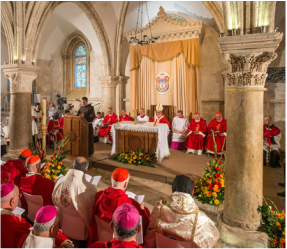
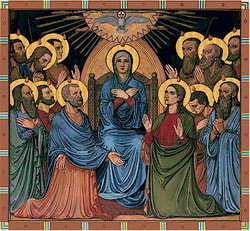





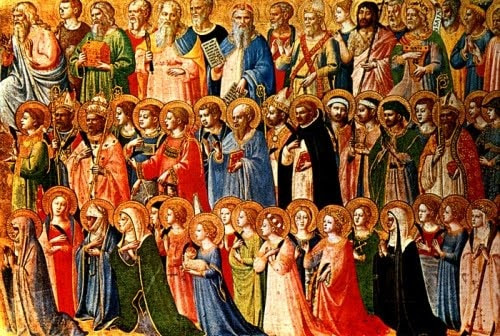

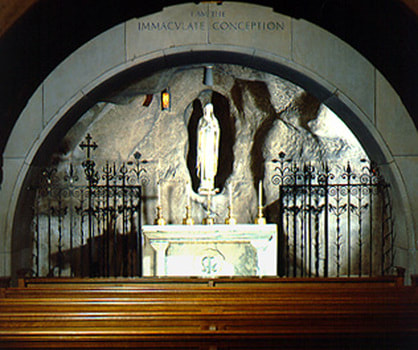
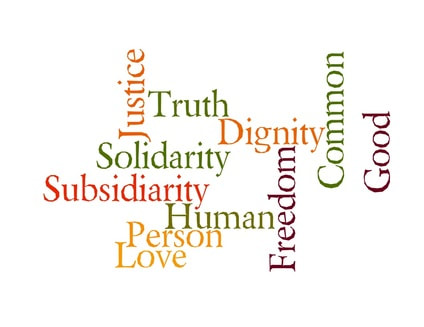

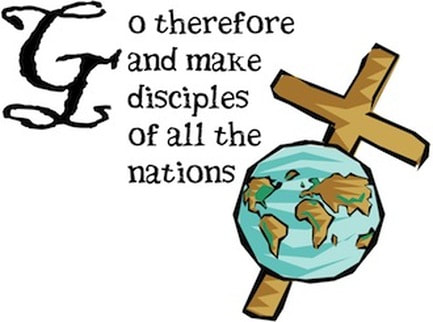
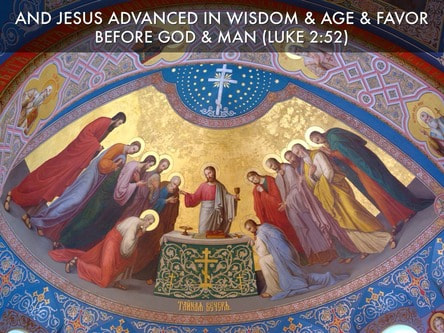
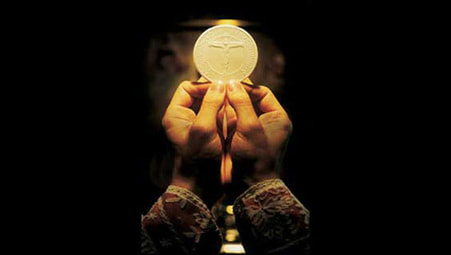
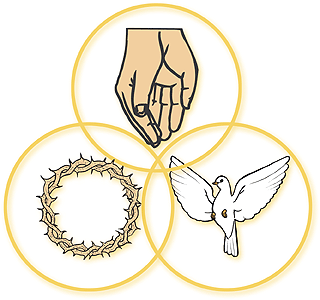
 RSS Feed
RSS Feed